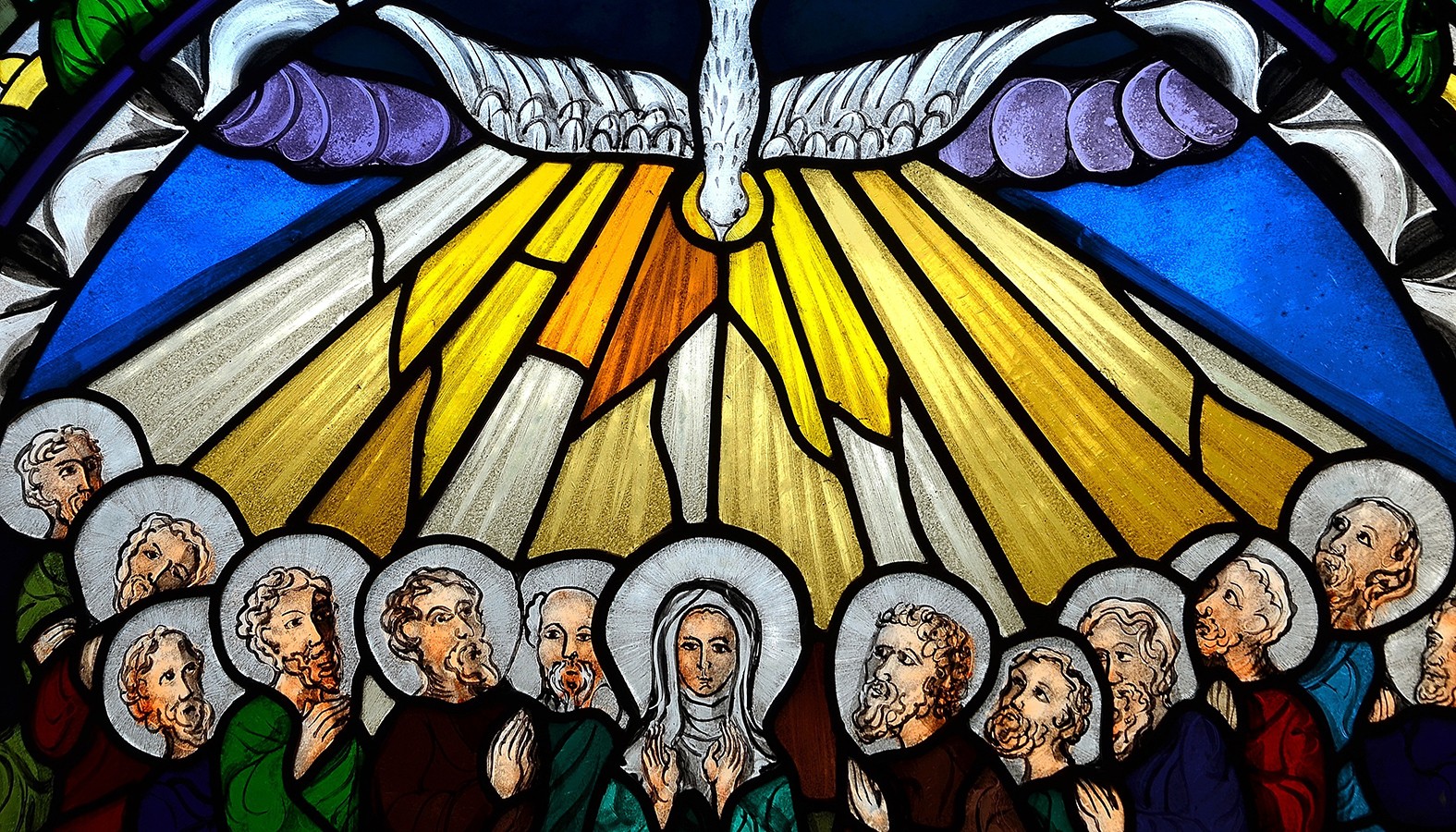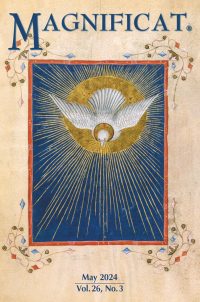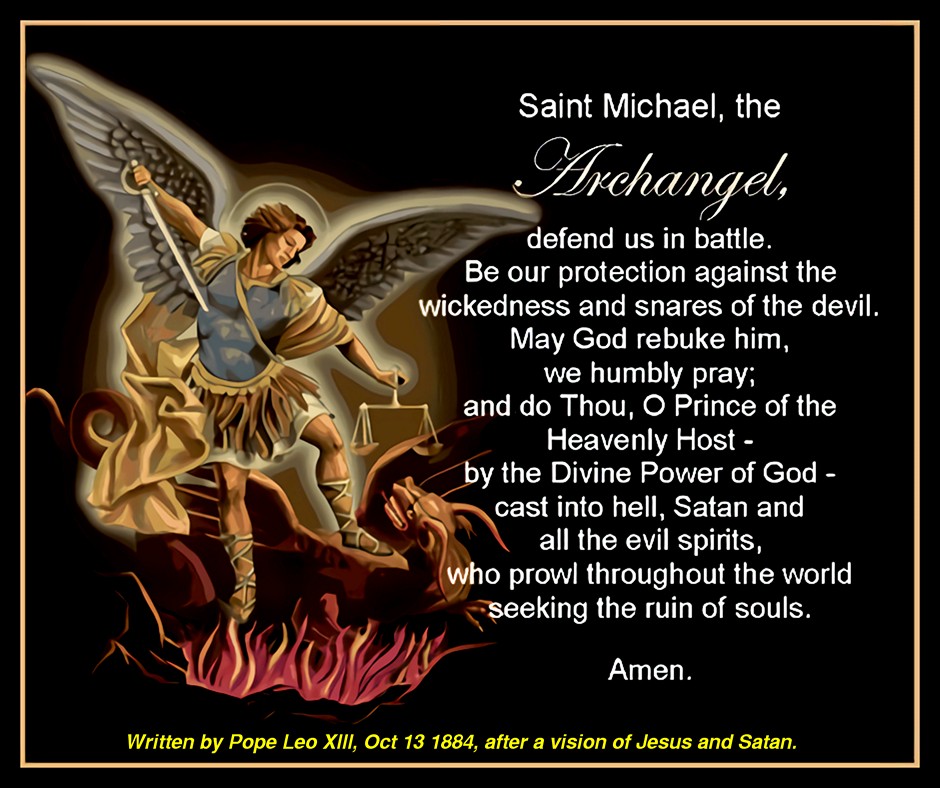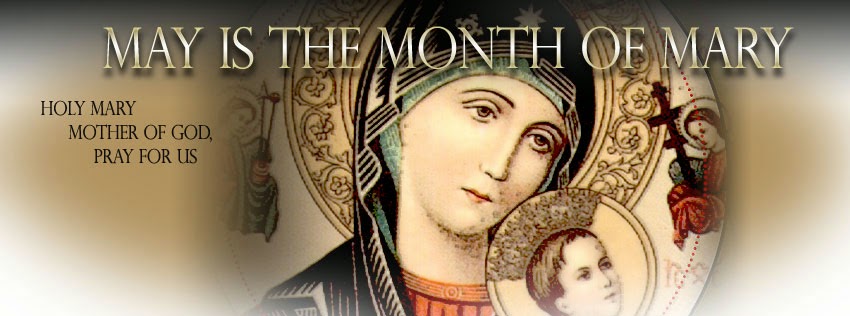Pentecost  St. Dunstan Catholic Church, Millbrae, CA Readings at MassLiturgical Colour: Red. Year: B(II). These readings are for the extended-form Vigil Mass on the evening before the feast. These readings are for the simple-form Vigil Mass on the evening before the feast. These readings are for the day of the feast itself. These readings are for the extended-form Vigil Mass on the evening before the feast.
The tower of BabelThroughout the earth men spoke the same language, with the same vocabulary. Now as they moved eastwards they found a plain in the land of Shinar where they settled. They said to one another, ‘Come, let us make bricks and bake them in the fire.’ (For stone they used bricks, and for mortar they used bitumen). ‘Come,’ they said ‘let us build ourselves a town and a tower with its top reaching heaven. Let us make a name for ourselves, so that we may not be scattered about the whole earth.’ Now the Lord came down to see the town and the tower that the sons of man had built. ‘So they are all a single people with a single language!’ said the Lord. ‘This is but the start of their undertakings! There will be nothing too hard for them to do. Come, let us go down and confuse their language on the spot so that they can no longer understand one another.’ The Lord scattered them thence over the whole face of the earth, and they stopped building the town. It was named Babel therefore, because there the Lord confused the language of the whole earth. It was from there that the Lord scattered them over the whole face of the earth.
Happy the people the Lord has chosen as his own. He frustrates the designs of the nations, he defeats the plans of the peoples. His own designs shall stand for ever, the plans of his heart from age to age. Happy the people the Lord has chosen as his own. They are happy, whose God is the Lord, the people he has chosen as his own. From the heavens the Lord looks forth, he sees all the children of men. Happy the people the Lord has chosen as his own. From the place where he dwells he gazes on all the dwellers on the earth; he who shapes the hearts of them all; and considers all their deeds. Happy the people the Lord has chosen as his own.
Moses led the people out of the camp to meet GodMoses went up to God, and the Lord called to him from the mountain, saying, ‘Say this to the House of Jacob, declare this to the sons of Israel: ‘“You yourselves have seen what I did with the Egyptians, how I carried you on eagle’s wings and brought you to myself. From this you know that now, if you obey my voice and hold fast to my covenant, you of all the nations shall be my very own, for all the earth is mine. I will count you a kingdom of priests, a consecrated nation.” ‘Those are the words you are to speak to the sons of Israel.’ So Moses went and summoned the elders of the people, putting before them all that the Lord had bidden him. Then all the people answered as one, ‘All that the Lord has said, we will do.’ Now at daybreak on the third day there were peals of thunder on the mountain and lightning flashes, a dense cloud, and a loud trumpet blast, and inside the camp all the people trembled. Then Moses led the people out of the camp to meet God; and they stood at the bottom of the mountain. The mountain of Sinai was entirely wrapped in smoke, because the Lord had descended on it in the form of fire. Like smoke from a furnace the smoke went up, and the whole mountain shook violently. Louder and louder grew the sound of the trumpet. Moses spoke, and God answered him with peals of thunder. The Lord came down on the mountain of Sinai, on the mountain top, and the Lord called Moses to the top of the mountain.
To you glory and praise for evermore. You are blest, Lord God of our fathers. To you glory and praise for evermore. Blest your glorious holy name. To you glory and praise for evermore. You are blest in the temple of your glory. To you glory and praise for evermore. You are blest on the throne of your kingdom. To you glory and praise for evermore. You are blest who gaze into the depths. To you glory and praise for evermore. You are blest in the firmament of heaven. To you glory and praise for evermore.
A vision of Israel's death and resurrectionThe hand of the Lord was laid on me, and he carried me away by the spirit of the Lord and set me down in the middle of a valley, a valley full of bones. He made me walk up and down among them. There were vast quantities of these bones on the ground the whole length of the valley; and they were quite dried up. He said to me, ‘Son of man, can these bones live?’ I said, ‘You know, Lord.’ He said, ‘Prophesy over these bones. Say, “Dry bones, hear the word of the Lord. The Lord says this to these bones: I am now going to make the breath enter you, and you will live. I shall put sinews on you, I shall make flesh grow on you, I shall cover you with skin and give you breath, and you will live; and you will learn that I am the Lord.”’ I prophesied as I had been ordered. While I was prophesying, there was a noise, a sound of clattering; and the bones joined together. I looked, and saw that they were covered with sinews; flesh was growing on them and skin was covering them, but there was no breath in them. He said to me, ‘Prophesy to the breath; prophesy, son of man. Say to the breath, “The Lord says this: Come from the four winds, breath; breathe on these dead; let them live!”’ I prophesied as he had ordered me, and the breath entered them; they came to life again and stood up on their feet, a great, an immense army. Then he said, ‘Son of man, these bones are the whole House of Israel. They keep saying, “Our bones are dried up, our hope has gone; we are as good as dead.” So prophesy. Say to them, “The Lord says this: I am now going to open your graves; I mean to raise you from your graves, my people, and lead you back to the soil of Israel. And you will know that I am the Lord, when I open your graves and raise you from your graves, my people. And I shall put my spirit in you, and you will live, and I shall resettle you on your own soil; and you will know that I, the Lord, have said and done this – it is the Lord who speaks.”’
O give thanks to the Lord for he is good, for his love has no end. or Alleluia! Let them say this, the Lord’s redeemed, whom he redeemed from the hand of the foe and gathered from far-off lands, from east and west, north and south. O give thanks to the Lord for he is good, for his love has no end. or Alleluia! Some wandered in the desert, in the wilderness, finding no way to a city they could dwell in. Hungry they were and thirsty; their soul was fainting within them. O give thanks to the Lord for he is good, for his love has no end. or Alleluia! Then they cried to the Lord in their need and he rescued them from their distress and he led them along the right way, to reach a city they could dwell in. O give thanks to the Lord for he is good, for his love has no end. or Alleluia! Let them thank the Lord for his love, for the wonders he does for men: for he satisfies the thirsty soul; he fills the hungry with good things. O give thanks to the Lord for he is good, for his love has no end. or Alleluia!
I will pour out my spirit on all mankindThus says the Lord: ‘I will pour out my spirit on all mankind. Your sons and daughters shall prophesy, your old men shall dream dreams, and your young men see visions. Even on the slaves, men and women, will I pour out my spirit in those days. I will display portents in heaven and on earth, blood and fire and columns of smoke.’ The sun will be turned into darkness, and the moon into blood, before the day of the Lord dawns, that great and terrible day. All who call on the name of the Lord will be saved, for on Mount Zion there will be some who have escaped, as the Lord has said, and in Jerusalem some survivors whom the Lord will call.
Send forth your spirit, O Lord, and renew the face of the earth. or Alleluia! Bless the Lord, my soul! Lord God, how great you are, clothed in majesty and glory, wrapped in light as in a robe! Send forth your spirit, O Lord, and renew the face of the earth. or Alleluia! How many are your works, O Lord! In wisdom you have made them all. The earth is full of your riches. Bless the Lord, my soul. Send forth your spirit, O Lord, and renew the face of the earth. or Alleluia! All of these look to you to give them their food in due season. You give it, they gather it up: you open your hand, they have their fill. Send forth your spirit, O Lord, and renew the face of the earth. or Alleluia! You take back your spirit, they die, returning to the dust from which they came. You send forth your spirit, they are created; and you renew the face of the earth. Send forth your spirit, O Lord, and renew the face of the earth. or Alleluia!
The Spirit himself expresses our plea in a way that could never be put into wordsFrom the beginning till now the entire creation, as we know, has been groaning in one great act of giving birth; and not only creation, but all of us who possess the first-fruits of the Spirit, we too groan inwardly as we wait for our bodies to be set free. For we must be content to hope that we shall be saved – our salvation is not in sight, we should not have to be hoping for it if it were – but, as I say, we must hope to be saved since we are not saved yet – it is something we must wait for with patience. The Spirit too comes to help us in our weakness. For when we cannot choose words in order to pray properly, the Spirit himself expresses our plea in a way that could never be put into words, and God who knows everything in our hearts knows perfectly well what he means, and that the pleas of the saints expressed by the Spirit are according to the mind of God.
Alleluia, alleluia! Come, Holy Spirit, fill the hearts of the faithful and kindle in them the fire of your love. Alleluia!
'If any man is thirsty, let him come to me!'On the last day and greatest day of the festival, Jesus stood there and cried out: ‘If any man is thirsty, let him come to me! Let the man come and drink who believes in me!’ As scripture says: From his breast shall flow fountains of living water. He was speaking of the Spirit which those who believed in him were to receive; for there was no Spirit as yet because Jesus had not yet been glorified. These readings are for the simple-form Vigil Mass on the evening before the feast.
The tower of BabelThroughout the earth men spoke the same language, with the same vocabulary. Now as they moved eastwards they found a plain in the land of Shinar where they settled. They said to one another, ‘Come, let us make bricks and bake them in the fire.’ (For stone they used bricks, and for mortar they used bitumen). ‘Come,’ they said ‘let us build ourselves a town and a tower with its top reaching heaven. Let us make a name for ourselves, so that we may not be scattered about the whole earth.’ Now the Lord came down to see the town and the tower that the sons of man had built. ‘So they are all a single people with a single language!’ said the Lord. ‘This is but the start of their undertakings! There will be nothing too hard for them to do. Come, let us go down and confuse their language on the spot so that they can no longer understand one another.’ The Lord scattered them thence over the whole face of the earth, and they stopped building the town. It was named Babel therefore, because there the Lord confused the language of the whole earth. It was from there that the Lord scattered them over the whole face of the earth.
Send forth your spirit, O Lord, and renew the face of the earth. or Alleluia! Bless the Lord, my soul! Lord God, how great you are, clothed in majesty and glory, wrapped in light as in a robe! Send forth your spirit, O Lord, and renew the face of the earth. or Alleluia! How many are your works, O Lord! In wisdom you have made them all. The earth is full of your riches. Bless the Lord, my soul. Send forth your spirit, O Lord, and renew the face of the earth. or Alleluia! All of these look to you to give them their food in due season. You give it, they gather it up: you open your hand, they have their fill. Send forth your spirit, O Lord, and renew the face of the earth. or Alleluia! You take back your spirit, they die, returning to the dust from which they came. You send forth your spirit, they are created; and you renew the face of the earth. Send forth your spirit, O Lord, and renew the face of the earth. or Alleluia!
The Spirit himself expresses our plea in a way that could never be put into wordsFrom the beginning till now the entire creation, as we know, has been groaning in one great act of giving birth; and not only creation, but all of us who possess the first-fruits of the Spirit, we too groan inwardly as we wait for our bodies to be set free. For we must be content to hope that we shall be saved – our salvation is not in sight, we should not have to be hoping for it if it were – but, as I say, we must hope to be saved since we are not saved yet – it is something we must wait for with patience. The Spirit too comes to help us in our weakness. For when we cannot choose words in order to pray properly, the Spirit himself expresses our plea in a way that could never be put into words, and God who knows everything in our hearts knows perfectly well what he means, and that the pleas of the saints expressed by the Spirit are according to the mind of God.
Alleluia, alleluia! Come, Holy Spirit, fill the hearts of the faithful and kindle in them the fire of your love. Alleluia!
'If any man is thirsty, let him come to me!'On the last day and greatest day of the festival, Jesus stood there and cried out: ‘If any man is thirsty, let him come to me! Let the man come and drink who believes in me!’ As scripture says: From his breast shall flow fountains of living water. He was speaking of the Spirit which those who believed in him were to receive; for there was no Spirit as yet because Jesus had not yet been glorified. These readings are for the day of the feast itself.
They were all filled with the Holy Spirit and began to speakWhen Pentecost day came round, they had all met in one room, when suddenly they heard what sounded like a powerful wind from heaven, the noise of which filled the entire house in which they were sitting; and something appeared to them that seemed like tongues of fire; these separated and came to rest on the head of each of them. They were all filled with the Holy Spirit, and began to speak foreign languages as the Spirit gave them the gift of speech. Now there were devout men living in Jerusalem from every nation under heaven, and at this sound they all assembled, each one bewildered to hear these men speaking his own language. They were amazed and astonished. ‘Surely’ they said ‘all these men speaking are Galileans? How does it happen that each of us hears them in his own native language? Parthians, Medes and Elamites; people from Mesopotamia, Judaea and Cappadocia, Pontus and Asia, Phrygia and Pamphylia, Egypt and the parts of Libya round Cyrene; as well as visitors from Rome – Jews and proselytes alike – Cretans and Arabs; we hear them preaching in our own language about the marvels of God.’
Send forth your spirit, O Lord, and renew the face of the earth. or Alleluia! Bless the Lord, my soul! Lord God, how great you are, How many are your works, O Lord! The earth is full of your riches. Send forth your spirit, O Lord, and renew the face of the earth. or Alleluia! You take back your spirit, they die, returning to the dust from which they came. You send forth your spirit, they are created; and you renew the face of the earth. Send forth your spirit, O Lord, and renew the face of the earth. or Alleluia! May the glory of the Lord last for ever! May the Lord rejoice in his works! May my thoughts be pleasing to him. I find my joy in the Lord. Send forth your spirit, O Lord, and renew the face of the earth. or Alleluia!
If you are led by the Spirit, no law can touch youIf you are guided by the Spirit you will be in no danger of yielding to self-indulgence, since self-indulgence is the opposite of the Spirit, the Spirit is totally against such a thing, and it is precisely because the two are so opposed that you do not always carry out your good intentions. If you are led by the Spirit, no law can touch you. When self-indulgence is at work the results are obvious: fornication, gross indecency and sexual irresponsibility; idolatry and sorcery; feuds and wrangling, jealousy, bad temper and quarrels; disagreements, factions, envy; drunkenness, orgies and similar things. I warn you now, as I warned you before: those who behave like this will not inherit the kingdom of God. What the Spirit brings is very different: love, joy, peace, patience, kindness, goodness, trustfulness, gentleness and self-control. There can be no law against things like that, of course. You cannot belong to Christ Jesus unless you crucify all self-indulgent passions and desires. Since the Spirit is our life, let us be directed by the Spirit.
Veni, sancte SpiritusHoly Spirit, Lord of Light, From the clear celestial height Thy pure beaming radiance give. Come, thou Father of the poor, Come with treasures which endure Come, thou light of all that live! Thou, of all consolers best, Thou, the soul’s delightful guest, Dost refreshing peace bestow Thou in toil art comfort sweet Pleasant coolness in the heat Solace in the midst of woe. Light immortal, light divine, Visit thou these hearts of thine, And our inmost being fill: If thou take thy grace away, Nothing pure in man will stay All his good is turned to ill. Heal our wounds, our strength renew On our dryness pour thy dew Wash the stains of guilt away: Bend the stubborn heart and will Melt the frozen, warm the chill Guide the steps that go astray. Thou, on us who evermore Thee confess and thee adore, With thy sevenfold gifts descend: Give us comfort when we die Give us life with thee on high Give us joys that never end.
Alleluia, alleluia! Come, Holy Spirit, fill the hearts of your faithful and kindle in them the fire of your love. Alleluia!
The Spirit of truth will lead you to the complete truthJesus said to his disciples: ‘When the Advocate comes, whom I shall send to you from the Father, the Spirit of truth who issues from the Father, he will be my witness. And you too will be witnesses, because you have been with me from the outset. ‘I still have many things to say to you but they would be too much for you now. But when the Spirit of truth comes he will lead you to the complete truth, since he will not be speaking as from himself but will say only what he has learnt; and he will tell you of the things to come. He will glorify me, since all he tells you will be taken from what is mine. Everything the Father has is mine; that is why I said: All he tells you will be taken from what is mine.’ Universalis podcast: The week ahead – from 19 to 25 MayPentecost; the works of the Holy Spirit; Hebrew and Greek culture; St Bede the Venerable. (14 minutes) Christian Art Each day, The Christian Art website gives a picture and reflection on the Gospel of the day. The readings on this page are from the Jerusalem Bible, which is used at Mass in most of the English-speaking world. The New American Bible readings, which are used at Mass in the United States, are available in the Universalis apps, programs and downloads. |









